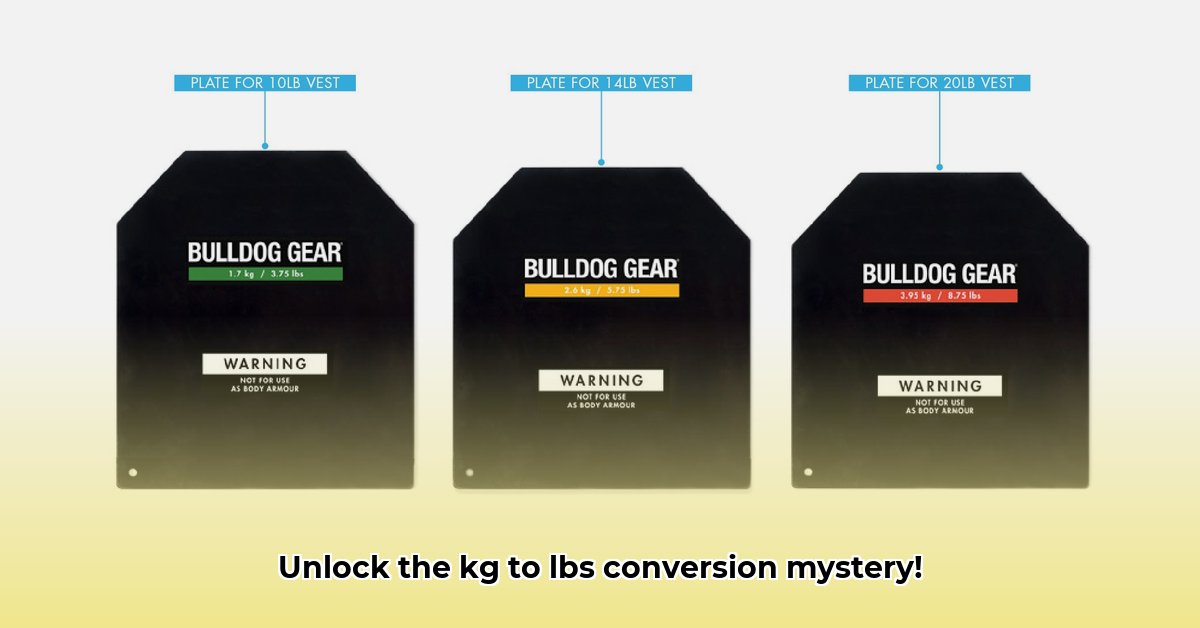
3.95 kg to lbs: A Step-by-Step Conversion
Converting kilograms (kg) to pounds (lbs) seems straightforward, but achieving precise results requires understanding the nuances involved. This guide provides a clear, step-by-step process for converting 3.95 kg to lbs, addressing both everyday needs and situations demanding higher accuracy. For more detailed conversion examples, see this helpful resource.
Understanding Kilograms and Pounds
Before we begin, it's crucial to differentiate between mass and weight. Kilograms measure mass, the amount of matter in an object. Pounds measure weight, the force of gravity acting on that mass. While often used interchangeably in everyday life, the distinction becomes vital for precise scientific applications.
Method 1: The Quick Conversion
For most everyday purposes, a simplified conversion factor suffices. Multiply the kilograms by approximately 2.20462:
3.95 kg * 2.20462 lbs/kg ≈ 8.71 lbs
This provides a readily usable approximation. Is this level of precision sufficient for your needs? Often, yes. But let's explore a more accurate approach.
Method 2: Precise Conversion for Scientific Applications
Scientific and engineering applications demand greater accuracy. Using a more precise conversion factor and paying close attention to significant figures is vital.
- Start with the value: 3.95 kg.
- Apply the precise conversion factor: We use a more precise value such as 2.20462262 lbs/kg.
- Calculate: 3.95 kg * 2.20462262 lbs/kg = 8.7082593 lbs.
- Round appropriately: The number of decimal places you retain depends on the required level of precision of your application. For many scientific purposes, rounding to three decimal places (8.708 lbs) would be appropriate.
Why the Differences? Accuracy and Significant Figures
The slight variations you might encounter between different conversion methods stem from the number of significant figures used in the conversion factor. Using a more extensive factor, as shown above, increases accuracy but isn't always necessary. How many decimal places are needed? This depends entirely on the application. Do you need an accurate weight for baking a cake? Simple rounding is likely sufficient. For scientific research? A far higher degree of precision will likely be required.
Beyond the Basics: Factors Influencing Precision
While the basic conversion is relatively simple, several lesser-known factors can influence the precision of your result, though in most cases, these differences are negligible.
- Variations in Gravity: Gravity's strength varies slightly across Earth's surface. This means the weight of an object – the force of gravity acting on its mass – might change slightly depending on your location. This difference, however, is usually too small to be of practical concern.
- The Conversion Factor Itself: As explained earlier, using a more or less precise conversion factor significantly impacts the final answer in the most critical applications.
Choosing the Right Method: Accuracy vs. Simplicity
The best approach depends entirely on your needs. For everyday tasks, the quick conversion (Method 1) is generally adequate. But for situations demanding higher accuracy, scientific research for example, Method 2 is essential. Choosing the right conversion method is key to obtaining reliable results.
Key Takeaways
- Converting 3.95 kg to lbs yields approximately 8.71 lbs using a simplified method or 8.708 lbs using a more precise method.
- The level of precision required depends entirely on the application, ranging from everyday activities to high-precision scientific research.
- Understanding the difference between mass and weight is crucial, especially in scientific contexts.
- Always consider the context and required accuracy when selecting a conversion method.